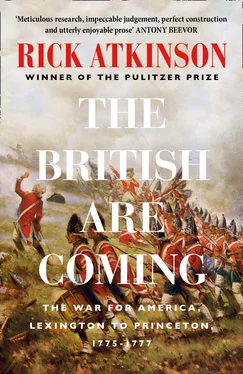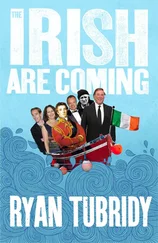Devoted to George, he would stay the course set by his monarch, a vessel for the king’s obstinacy. A loyal friend though perhaps not a good one, he reinforced His Majesty’s narrow attitudes rather than gently widening his vision. It was North, after all, who in 1770 had said, “I can never acquiesce in the absurd notion that all men are equal.” Now, with his stack of 149 documents as proof of American perfidy, he would seek Parliament’s agreement to force submission.
The first obstacle arose in the other chamber, the House of Lords, which met nearby in a medieval hall at the south end of the Westminster warren. On January 20, William Pitt, the Earl of Chatham, the venerable statesman and strategist who had engineered Britain’s victory in the Seven Years’ War, rose to his feet to denounce the government’s folly and to demand withdrawal of British troops from Boston. “He seemed like an old Roman senator,” a witness in the gallery reported, “rising with the dignity of age, yet speaking with the fire of youth.” Chatham’s long decline, physical and mental, was well advanced—he called himself “the scarecrow of violence”—but he knew his mind in urging reconciliation with the Americans. “All attempts to impose servitude upon such men, to establish despotism over such a mighty continental nation must be in vain,” he warned. “We shall be forced, ultimately, to retract. Let us retract while we can, not when we must.” France and Spain, he told the peers, “are watching your conduct, and waiting for the maturity of your errors.” He continued:
My lords, there is no time to be lost. Every moment is big with dangers.… The very first drop of blood will make a wound that will not easily be skinned over.
The old lion’s eloquence changed few minds; his motion lost 68 to 18. Ten days later, Chatham would try again with a proposal to designate Congress as a lawful entity and to suspend the Coercive Acts, with complete repeal to follow upon American acknowledgment of Parliament’s authority. Once again a heavy majority defeated the bill. Chatham wrote his wife that the government seemed “violent beyond expectation, almost to madness.”
To Lord North’s satisfaction, the House of Commons proved no less bellicose. American insurgents were “an enemy in the bowels of the kingdom,” one member insisted. Another who had seen military service in America during the last war assured his colleagues that five thousand British regulars could march through the colonies unhindered; Americans, “of a pusillanimous disposition, and utterly incapable of any sort of order or discipline,” would “never dare to face an English army.” It helped the government’s cause that roughly a hundred members of the Commons were past or current military officers, reliably loyal. It also helped that North had spent £50,000 from a Treasury slush fund in the 1774 election to buy a couple dozen seats for other pliant candidates. Further, the king had purchased additional loyalty by sprinkling lucrative sinecures and patronage appointments among members of both houses, including eleven grooms of the bedchamber, a master of the jewel office, a master falconer, an usher of the exchequer, rangers of the royal forests, seven equerries, and various masters of the harriers, buckhounds, and staghounds. “This Parliament,” observed the writer Horace Walpole, the son of a former prime minister, “appeared to be even more corrupt and servile than the two last.”
At two-thirty a.m. on February 7, the Commons by a vote of 288 to 105 supported North’s proposal to ask the king to declare Massachusetts in rebellion, and to take all measures needed to bring American insurgents to heel. “If they would submit and leave us the constitutional right of supremacy,” North said, “the quarrel would be at an end.” The Lords followed suit, 104 to 29, at one-forty a.m. the following morning. Among new members voting with the Commons majority was an elfin man with a double chin and a squat nose who in his study on Bentinck Street was writing a great saga, the first volume of which would soon be published as The History of the Decline and Fall of the Roman Empire . Few parliamentarians would be as steadfast for the Crown as Edward Gibbon. “We have both the right and the power on our side,” he had told a friend a week earlier. “We are now arrived at the decisive moment of preserving, or of losing forever, both our trade and empire.” Yet few would be as reflective, as when he later conceded, “I took my seat at the beginning of the memorable contest between Great Britain and America, and supported with many a sincere and silent vote, the rights, though not perhaps the interest, of the mother country.” For now, a few hours after casting his vote, Gibbon wrote, “With firmness, all may go well. Yet I sometimes doubt.”
The king had no doubts. Parliament’s resolve “ought to open the eyes of the deluded Americans,” he wrote North on the morning of Wednesday, February 8. “But if it does not, it must set every delicate man at liberty to avow the propriety of the most coercive measures.” Beyond majority votes in both houses, George wanted a theatrical, public display of support. A few hours later, he again wrote North to propose “a large attendance” at St. James’s the next day. Hundreds from the Commons and the Lords were to make the short journey to the palace, as a group, to demonstrate unity. “I therefore hope,” he added, “you will insinuate the propriety of this.”
Shortly before three p.m. on Thursday, braving a blustery wind from the southwest, Parliament picked a path through the willows and poplars of St. James’s Park to the red brick octagonal towers of that “irregular pile,” as one critic described the palace. The London Gazette would report that “there never was known so many of the bishops and peers to attend an address to His Majesty.… There was also the greatest number of commoners ever known on a like occasion.” Not far from the hearth inscribed with the initials of Henry VIII and his doomed queen Anne Boleyn, the king listened as Parliament’s petition was read aloud:
We find that a part of your Majesty’s subjects in the province of the Massachusetts Bay have proceeded so far to resist the authority of the supreme legislature, that a rebellion at this time actually exists.… We consider it as our indispensable duty, humbly to beseech your Majesty that you will take the most effectual measures to enforce due obedience to the laws and authority of the supreme legislature.
George was nearsighted, and some faces around the room were blurry as he read his brief reply, composed with North’s help:
You may depend on my taking the most speedy and effectual measures for enforcing due obedience to the laws.… It is my ardent wish that this disposition may have a happy effect on the temper and conduct of my subjects in America.
Events now moved swiftly. That very day the king ordered several regiments in Ireland to prepare for “foreign service.” On Friday, North introduced another bill, this one to prevent all New England colonies from trading with any foreign nations and to exclude them from the world’s richest fishing grounds, in the North Atlantic. That measure would again muster large majorities. A few days later, Parliament approved hiring another two thousand sailors for the navy; the government also requested money for an extra 4,400 soldiers, with the intention of expanding the army in America to almost 11,000. In recent weeks, the king had considered ousting the military commander there, Lieutenant General Thomas Gage, on suspicion of insufficient grit; instead he chose to send three young major generals to stiffen Gage’s spine. He told North to give each an extra £500 before they sailed—“they have behaved so very properly and are so poor.” Whatever Gage’s shortcomings, North knew that nearly all of the forty-five generals senior to him, some in their eighties, lacked the vigor, the experience, or the bloody-mindedness to take command in Boston. “I do not know whether our generals will frighten the enemy,” he supposedly quipped, “but I know that they frighten me.”
Читать дальше












